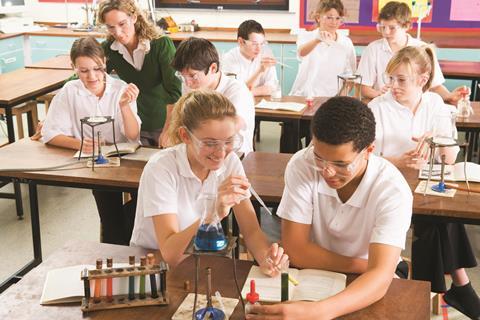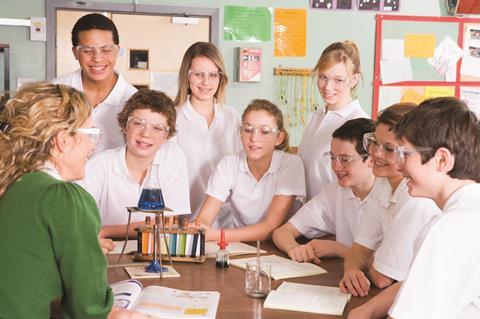Dorothy Warren takes a look at resources to develop students’ practical abilities

Throughout 2017 these professional development articles will focus on the teaching and learning of practical science. The aim is to help develop teachers’ knowledge and confidence in effectively embedding practical work in their teaching, by providing examples of how this can be achieved using existing resources and building on ideas and strategies used in our previous articles. This will develop students’ understanding so they can reflect on the skills they have learned and relate them to new contexts.
For teachers in England and Wales, the introduction of new GCSE chemistry specifications in 2016 places practical work at the heart of chemistry teaching and learning. Controlled assessment is gone. Practical skills will be assessed as part of the final written examination. This change follows the introduction of new A-level specifications in 2015, where controlled assessment was replaced by exam-based practical skills questions and a separate practical endorsement. So how does this affect chemistry teaching?
Practical skills at A-level: lessons learned so far
In many ways it is too early to draw hard conclusions about whether the changes at A-level are having a positive impact on student’s practical skills and the quality of teaching and learning of practical work. However, Neil Wade, a physics subject specialist at the awarding body OCR has made the following positive conclusions based on the findings from almost 500 A-level practical endorsement monitoring visits:
- More practical work is taking place
- Practical work is integrated into the scheme of work
- Enhanced learning is taking place
- A wider range of practical skills are being practised
What do the exam boards say about practical work at GCSE?
OCR: Removing controlled assessment from the science GCSEs gives control back to the teachers. It allows teachers to teach practical chemistry at the most appropriate time in the course. As long as the students understand key practical skills and can apply them to different contexts, the actual method used in class is not as important.
AQA: Practical work is at the heart of science – that’s why we have placed it at the heart of each of our GCSE science specifications. We believe that throughout the course students must be given the opportunity to experience a wide range of hands-on practical activities in order to develop their practical skills. We also encourage teachers to integrate the teaching of practical skills alongside the teaching of the chemistry content. Doing practical work enables students to make sense of new information and observations, and provides them with insights into the development of scientific thinking.
Edexcel: Our selection of core practicals are designed to help bring science learning to life. Students must carry out eight mandatory practical activities throughout the course. Suggested additional practicals are given beneath the content at the end of each topic in the specification.
WJEC: Practical work is an intrinsic part of this specification. It is vitally important in developing a conceptual understanding of many topics and it enhances the experience and enjoyment of science. The practical skills developed are also fundamentally important to learners going on to further study in science and related subjects, and are transferable to many careers.
Support for the practical challenge
One of the biggest challenges the new GCSE specifications bring is how to develop student understanding so they can reflect on the practical skills they learn in class and relate them to new contexts in the written exam.
Learn Chemistry offers a wealth of classroom-based chemistry resources and practical activities. A good place to start is the article Chemistry GCSE practical guide for England, which includes the required practical apparatus and techniques for chemistry as specified by the English national curriculum, mapped to Learn Chemistry resources.
If you take a look back at previous EiC CPD articles, many of which discuss and reflect upon different aspects of practical work, you will notice how they contain some ideas and strategies that are equally applicable to all levels. Some examples:

Practical work: a new opportunity: The main points exemplified in a post-16 context in this article apply equally to GCSE and Key Stage 3. Teachers need to be confident that when undertaking practical work, their students understand not only what they are doing but why they are doing it.
Moles and titrations: scary stuff? shows how teaching and learning of titrations can be broken down into manageable chunks – skills are developed over several sessions in a manageable way. This is a strategy that can be used to teach other practical skills, in different contexts.
Organic chemistry: a practical opportunity introduces reduced-scale experiments that help to get around some of the reasons for not doing organic chemistry practicals, such as the experiments are too long, too dangerous or too prescriptive. David, the author, points out that ‘practical work, when integrated with the theoretical background, engages students and develops their understanding of how science works.’
Using existing resources to develop practical skills
Many Learn Chemistry practical activities provide clear procedures and tips for getting good results. In order to develop student skills teachers sometimes need to tweak the way practical activities are presented in the classroom by providing a range of different opportunities, such as developing an enquiry or selecting equipment. It’s not that difficult to take a very simple experiment, such as Experiments with hydrogels: hair gel and disposable nappies and turn it in something more challenging, that both fits the curriculum and meets the intended learning outcomes for the lesson. Table 1 summarises the opportunities for developing practical skills based on the disposable nappies activity.
This resource outlines two activities that use modern materials and provide a real-life context into which practical skills can be developed. It also includes a summary of the relevant background chemistry on hydrogels. The nappy activity presents an ideal opportunity to teach practical skills through an enquiry-based approach or problem solving activity by presenting students with questions such as:
- How can we keep a baby’s bottom dry at night time?
- Which brand of nappies are best value for money?
- Which is better for the environment: reusable or disposable nappies?
Students can then go on to plan their investigations, which could include researching life cycle assessment data. Depending on the class, different levels of support, such as planning frameworks or prompt cards, may be used.
To further stretch students in this experiment – rather than just estimate the size of the hydrogel grains at the start and finish, as suggested in the procedure – students could measure the volume of water or mass of water actually absorbed by the hydrogel in the nappy. Taking this more quantitative approach would require a more accurate method of measuring volume than using the 100 cm3 beaker in the given procedure. It would also provide students with a set of quantitative data, which they could go on to analyse and evaluate as part of the enquiry.
| Working scientifically at Key Stage 3 | Working scientifically at Key Stage 4 | Apparatus and techniques at Key Stage 4 |
|---|---|---|
|
Experimental skills and investigations Ask questions and develop a line of enquiry based on observations of the real world |
Experimental skills and strategies Use scientific theories and explanations to develop a hypothesis |
Use of appropriate apparatus to make and record a range of measurements accurately, including mass and volume of liquids |
|
Select, plan and carry out the most appropriate types of scientific enquiries to test predictions |
Plan experiments or devise procedures to make observations |
Making and recording of appropriate observations during chemical reactions |
|
Use appropriate techniques and apparatus |
Select appropriate equipment |
|
|
Make and record observations and measurements using a range of different methods and suggest possible improvements |
Make and record observations |
|
|
Table 1: The practical skills developed in the hydrogel nappy activity |
||
Mapping practical skill development
In order to develop students’ practical skills it is important they are given the opportunity to develop their practical skills throughout secondary education. To ensure this happens, a good approach is to map the practical skills in to the scheme of learning alongside identified milestone activities that all students must do. Mapping practical skills and identifying milestone practical activities at Key Stage 3 will ensure full coverage of all the skills and therefore help to prepare your students for the rigours that lie ahead at GCSE and A-level.
Some schools are developing and using a practical skills passport at Key Stage 3, so students can keep a record of their own progress, which in itself is another important skill. The Science Passport originally published by the Association for Science Education to support transition from year 6 to year 7 is a good place to start if you want to develop your own.
Getting the most out of practical work
- The importance of objectives: Teachers need to be very clear about the specific reason for choosing each experiment
- Focusing on the task: Hands-on practical activities can be turned into minds-on activities by encouraging students to question what they do and make sense of their observations
- Learning to investigate: Provide students with adequate opportunities to learn how to plan an investigation
- Variety in practical work: Keep students engaged by using different approaches and strategies in practical work
- Contextualising practical work: This can bring practical work to life as students start to appreciate the important work chemists do in the world around them
- Integrating skill development leads to effective practical teaching throughout secondary education
Dorothy Warren is an independent science education consultant based in the UK
Acknowledgement
Thanks to Kay Stephenson for her help with this article









No comments yet